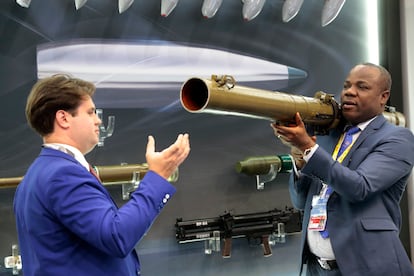Weapons, mercenaries and trade deals: Russia grows stronger in Africa
Moscow is extending its influence on the continent, where it benefits from a wave of growing disaffection towards the West

In the middle of the offensive in Ukraine, Russia and Cameroon signed a military agreement on April 12 for the exchange of information and training of troops, a type of deal that has become common in Africa and already exists in around 20 countries. Over the last decade, Moscow has extended its influence throughout the African continent based on three pillars: the sale of weapons, the presence of instructors and mercenaries, and trade agreements and investments in sectors such as cereals, hydrocarbons, energy and minerals.
Nothing happens by chance. In return, a third of African countries abstained on March 2 at the vote condemning the invasion of Ukraine at the United Nations General Assembly. This is taking place against a backdrop of growing popular sympathy for Russia and disaffection towards the West, which is seen as linked to a colonial past. There is a feeling of Soviet déjà vu harking back to the 1960s and 1970s.
Last week, two Russian combat helicopters and radars landed in Bamako. Since France decided to withdraw from Mali, the flow of weapons and military vehicles from Moscow to this country has intensified to previously unseen levels. Meanwhile, hundreds of Russian military instructors belonging to a Russian private military force known as the Wagner Group have landed in this African country, according to France and the US, and are already operating on the ground in the fight against jihadism. Since the end of 2021, coinciding with their arrival, reports from human rights organizations have noted an increase in abuses, torture and extrajudicial executions, such as the Moura massacre in which around 300 civilians died in this location in central Mali, according to Human Rights Watch. Al Qaeda last weekend announced it had captured a Wagner mercenary. And a Russian instructor died on April 19 after the vehicle he was traveling in hit a bomb.
While Europe and the United States intensify their sanctions against the regime of Vladimir Putin, African countries are maintaining a high degree of collaboration with Russian companies. “It is not that Africa is going to save Russia, but the continent is becoming one of the priorities of the Kremlin’s foreign policy, which will become much more aggressive in conquering African markets and in its propaganda, positioning itself as an alternative to its Western competitors,” says Tatiana Smirnova, an expert on relations between the two territories at the Centre FrancoPaix, at the University of Quebec in Montreal, Canada.
Russia is leaning on the image created in Africa by the Soviet Union, at a time when Moscow supported many liberation movements, trained students and built hospitalsTatiana Smirnova, Centre FrancoPaix, University of Quebec
Russia’s trade with Africa amounts to around €20 billion a year, according to statements made to Russia’s news agency Tass by the director of the African Export-Import Bank, Benedict Oramah. In any case, it is far behind powers such as China, the United States, France or even Turkey, which has been increasing its trade with Africa since 2014, when the figure stood at about €10 billion. Back then, Africa’s neutrality on the subject of sanctions against Moscow for the occupation of the Crimean peninsula stimulated Russia’s interest in the continent. Investments are also on the rise.
In the mining sector, one particularly relevant company is Rusal, headed by the oligarch Oleg Deripaska who is a personal friend of President Vladimir Putin and the target of Western sanctions. Rusal extracts bauxite in Guinea. But there are others such as Norgold, Renova, Alrosa or Vi Holding operating in countries like South Africa, Angola, Burkina Faso, Zimbabwe and the Central African Republic, where they extract gold, diamonds, manganese and platinum.
In the hydrocarbon, gas and oil sectors, a handful of Russian companies have become strong in Africa, such as Rosneft, Gazprom and above all the giant Lukoil, headed until a week ago by the billionaire tycoon Vagit Alekperov, who opposed the war in a statement and resigned two months later. These companies are present in countries such as Ghana, Cameroon and Nigeria.
From private business to state interest
The link between private businesses and the interests of the Russian state is close and evident in examples such as Alexandre Brégadzé, who is head of Rusal in Guinea, but also an architect and a former ambassador who trained at the Moscow Diplomatic Academy. The security sector also shows these relationships. The activities of the obscure Wagner mercenary group, which is present in Libya, Mozambique, Sudan, the Central African Republic and now also in Mali, are easily confused with those of the Russian Army itself and the group even uses the army’s means of transportation. According to Western intelligence services, Wagner is financed by Putin’s so-called chef, a businessman named Yevgheni Prighozin who has also been sanctioned by the US and the EU, and who met the Russian president when the latter dined at his restaurant in St. Petersburg.
More than a third of the weapons that Africa buys come from Russia, its main supplier, according to the Stockholm Peace Research Institute, and the two main recipient countries of this weaponry are Egypt and Algeria, but there are others such as Nigeria, Sudan, Angola and Mali. The equipment includes fighter-type aircraft, helicopters, assault craft, tanks, ammunition and air defense systems. The contracts between the state company Rosoboronexport and 20 African countries cover every kind of weapon these days.
Through these deals, African countries with dictatorial or military regimes that are under Western sanctions – such as Mali now, but also Libya or Zimbabwe during the Robert Mugabe regime – can gain access to weapons that other countries deny them.
“Russia is leaning on the image created in Africa by the Soviet Union, at a time when Moscow supported many liberation movements, trained students and built hospitals. It is perceived as a kind of older brother, a defender of Africa’s sovereignty, embodying an alternative development model to the Western one. But this idealized vision does not match the geopolitical and moral realities of today’s Russia that has unleashed the war in Ukraine,” adds Smirnova, from Centre FrancoPaix.
After the fall of the Soviet Union, under which tens of thousands of young African doctors, architects, engineers and soldiers were trained by the great power, relations plummeted. But a little over a decade ago, Putin himself inspired a triumphant comeback that reached a climax at the Russia-Africa summit held in Sochi in 2019, attended by as many as 45 heads of state from the African continent. A second meeting in Moscow is planned for 2022.
Tu suscripción se está usando en otro dispositivo
¿Quieres añadir otro usuario a tu suscripción?
Si continúas leyendo en este dispositivo, no se podrá leer en el otro.
FlechaTu suscripción se está usando en otro dispositivo y solo puedes acceder a EL PAÍS desde un dispositivo a la vez.
Si quieres compartir tu cuenta, cambia tu suscripción a la modalidad Premium, así podrás añadir otro usuario. Cada uno accederá con su propia cuenta de email, lo que os permitirá personalizar vuestra experiencia en EL PAÍS.
¿Tienes una suscripción de empresa? Accede aquí para contratar más cuentas.
En el caso de no saber quién está usando tu cuenta, te recomendamos cambiar tu contraseña aquí.
Si decides continuar compartiendo tu cuenta, este mensaje se mostrará en tu dispositivo y en el de la otra persona que está usando tu cuenta de forma indefinida, afectando a tu experiencia de lectura. Puedes consultar aquí los términos y condiciones de la suscripción digital.









































